Air Conditioning
Revisiting Common Air Conditioning Heat Pump Issues

Welcome back to our delve into widespread issues with air conditioning heat pumps.
Today, we delve into the intricate world of heat pump malfunctions, troubleshooting, and solutions.
Brace yourselves for a whirlwind journey through low cooling efficiency, refrigerant leaks, icing problems, noisy operations, and cycling issues.
Get ready to equip yourself with the knowledge and tools needed to conquer these challenges head-on.
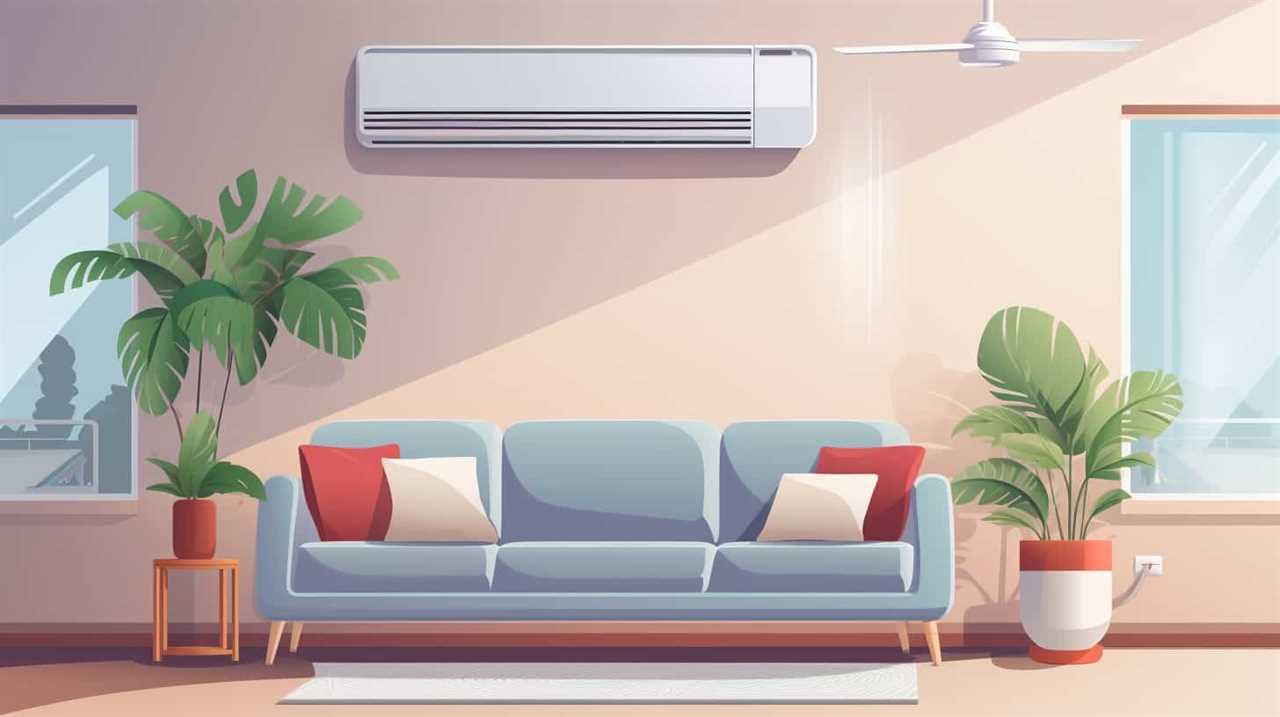
Together, let’s conquer the heat and serve your cooling needs with confidence.
Key Takeaways
- Regular maintenance is crucial in preventing heat pump failure and ensuring optimal performance.
- Signs of a malfunctioning heat pump include lack of heating or cooling, increased energy bills, and strange noises.
- Troubleshooting low cooling efficiency involves checking refrigerant levels, inspecting for leaks, and cleaning filters and outdoor units.
- Refrigerant leaks should be detected and repaired promptly to prevent further damage.
Common Causes of Heat Pump Failure
We have identified several common causes of heat pump failure.
One of the primary factors is improper heat pump maintenance. Regular maintenance is crucial to ensuring the longevity and optimal performance of a heat pump. Neglecting routine maintenance tasks such as cleaning or replacing filters, inspecting electrical connections, and lubricating moving parts can lead to significant issues down the line.
Another common cause of heat pump failure is exceeding the heat pump lifespan. Like any mechanical system, heat pumps have a finite lifespan. Over time, wear and tear can take a toll on the components, leading to decreased efficiency and eventual failure. It’s essential to keep track of the age of the heat pump and plan for replacement when necessary to avoid unexpected breakdowns.
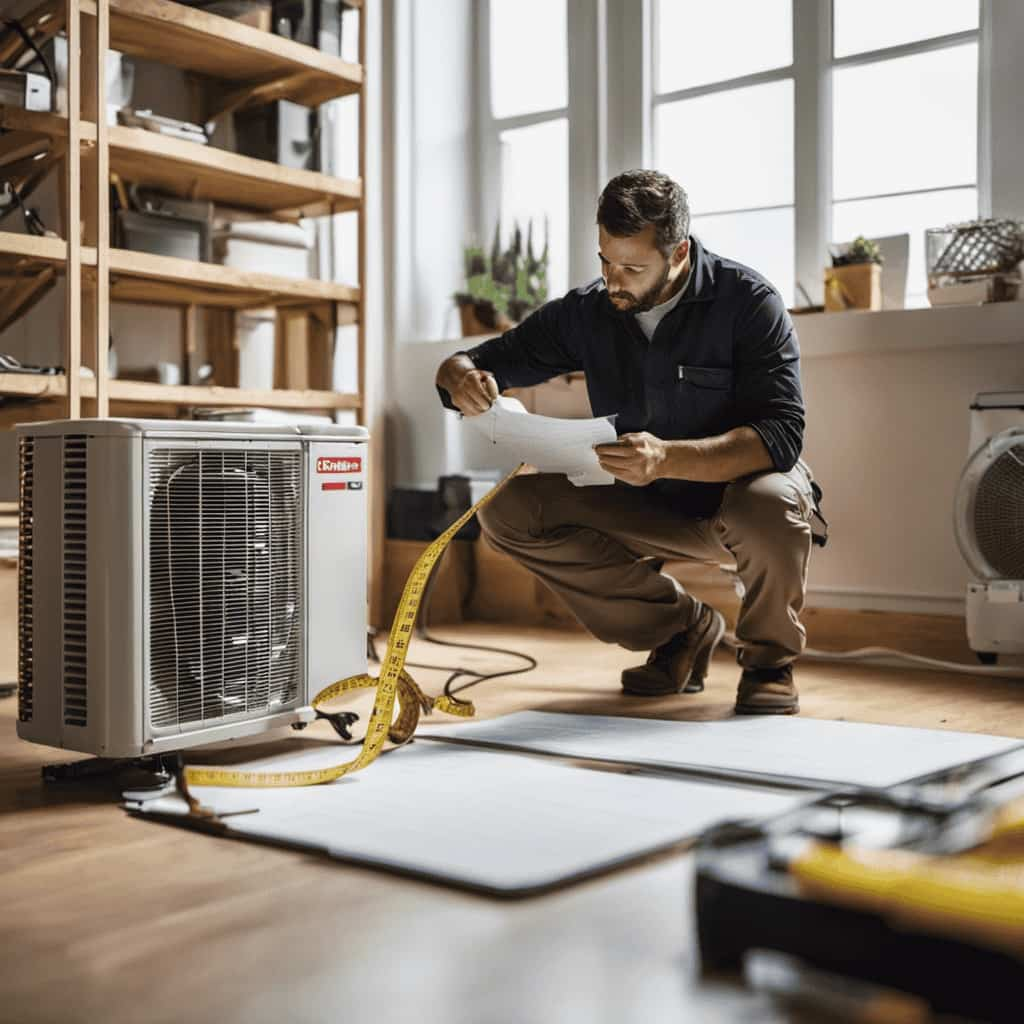
Signs of a Malfunctioning Heat Pump
One of the primary indicators of a malfunctioning heat pump is a lack of heating or cooling in the home. If you notice that your heat pump isn’t providing the desired temperature, it could be a sign of a problem.
Another common sign is an increase in your energy bills without a change in usage. This could indicate that your heat pump is working harder and less efficiently.
Additionally, if you hear strange noises coming from your heat pump, such as grinding or screeching sounds, it could be a sign of compressor failure. It’s important to address these issues promptly to avoid further damage and costly repairs.
Regular heat pump maintenance, such as cleaning the coils and changing the air filters, can help prevent these problems and ensure optimal performance.

Troubleshooting Low Cooling Efficiency
Our first step in troubleshooting low cooling efficiency is to check the refrigerant levels in the heat pump. Proper refrigerant levels are crucial for the optimal functioning of the system. Here are four key aspects to consider when trying to improve energy efficiency and optimize cooling performance:
-
Inspect for refrigerant leaks: Leaks can cause a decrease in refrigerant levels, leading to reduced cooling efficiency. Detecting and repairing any leaks is essential to maintain the proper refrigerant levels.
-
Clean the outdoor unit: Dust, dirt, and debris can accumulate on the outdoor unit, causing airflow restrictions and hindering cooling performance. Regularly cleaning the unit helps improve efficiency.
-
Check the air filters: Dirty or clogged air filters can impede airflow, forcing the system to work harder to cool the space. Cleaning or replacing the filters allows for better airflow and enhances energy efficiency.
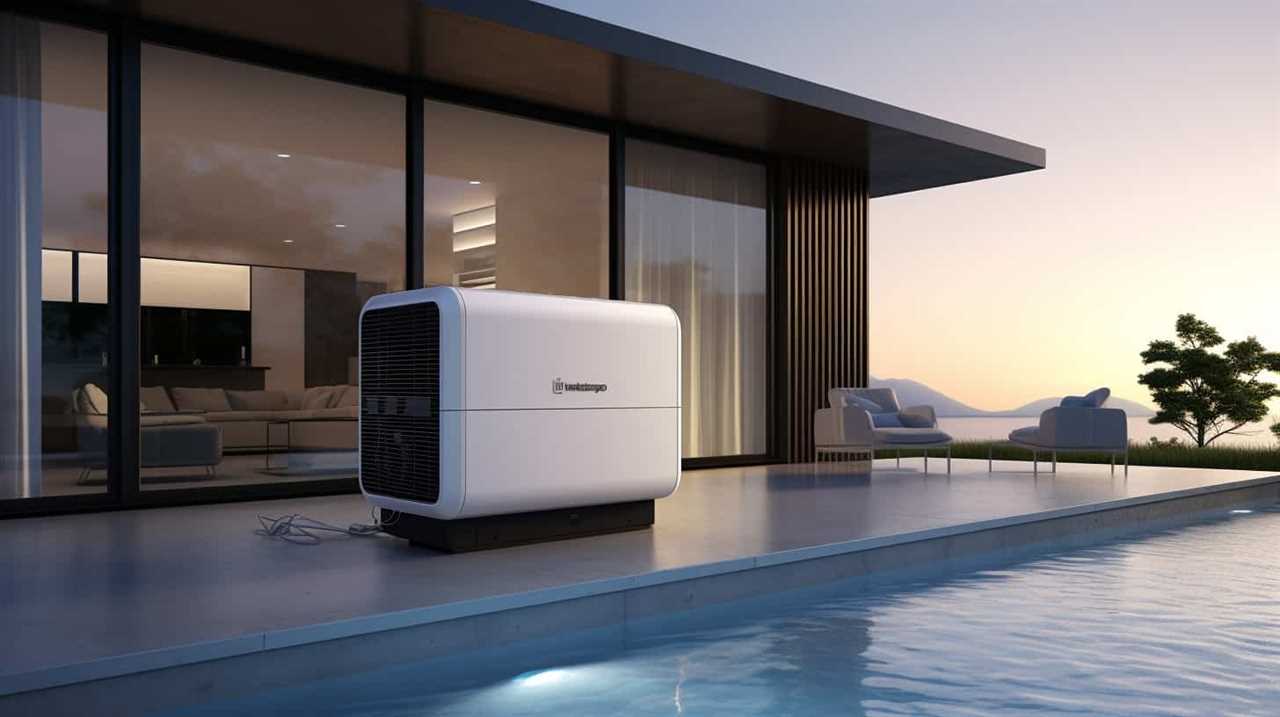
-
Ensure proper insulation: Insufficient insulation can result in cool air escaping and warm air entering the space. Properly insulating the area helps maintain a consistent temperature and improves cooling efficiency.
Dealing With Heat Pump Refrigerant Leaks
When it comes to heat pump refrigerant leaks, detecting them early is crucial.
We can usually identify refrigerant leaks by inspecting the system for oil stains, ice buildup, or hissing sounds.
Once the leak is located, we’ll need to repair it promptly to prevent further damage to the heat pump and ensure optimal cooling efficiency.
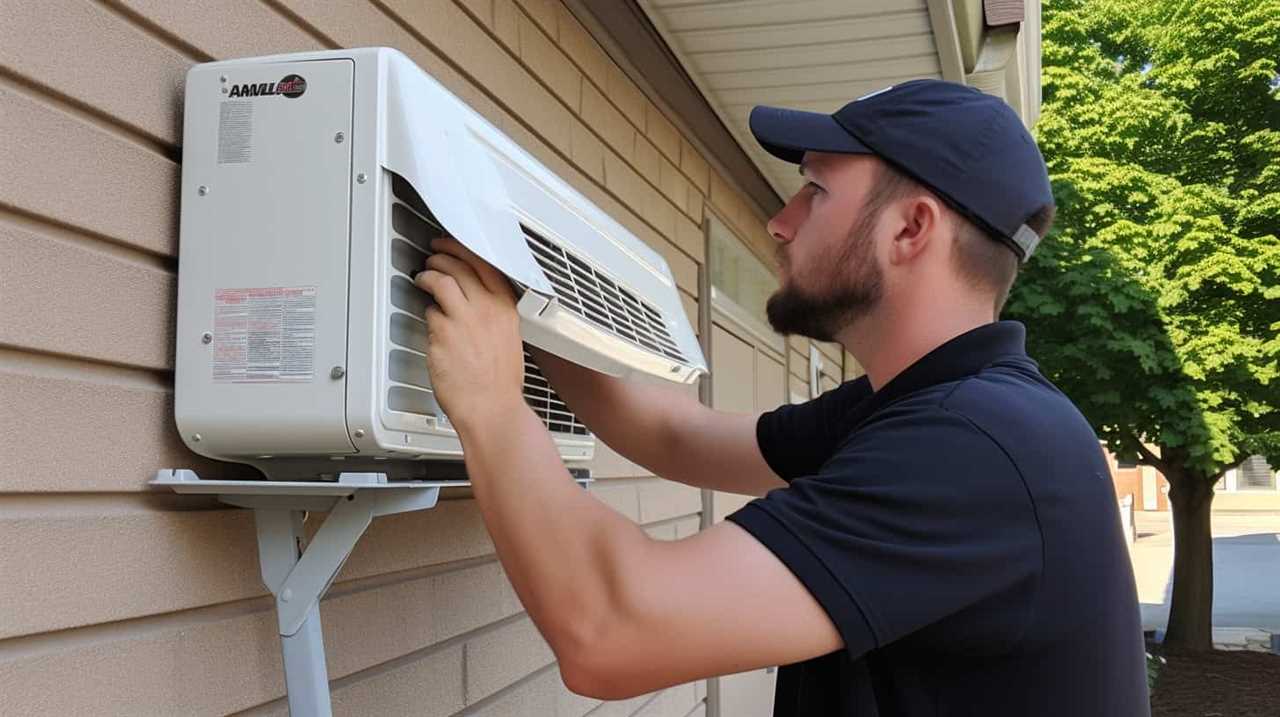
Detecting Refrigerant Leaks
If you suspect a refrigerant leak in your heat pump, it’s important to act promptly to prevent further damage and ensure optimal performance. Here are four important points to consider when it comes to detecting refrigerant leaks:
-
Visual inspection: Check for any signs of oil stains or residue around the heat pump unit, as this could indicate a refrigerant leak.
-
Electronic leak detectors: These handheld devices can detect refrigerant leaks by sensing the presence of certain gases. They’re highly accurate and can help locate leaks quickly.
-
UV dye detection: Adding a UV dye to the refrigerant can make leaks easier to detect. By using a UV light, technicians can identify any leaks by the presence of fluorescent dye.
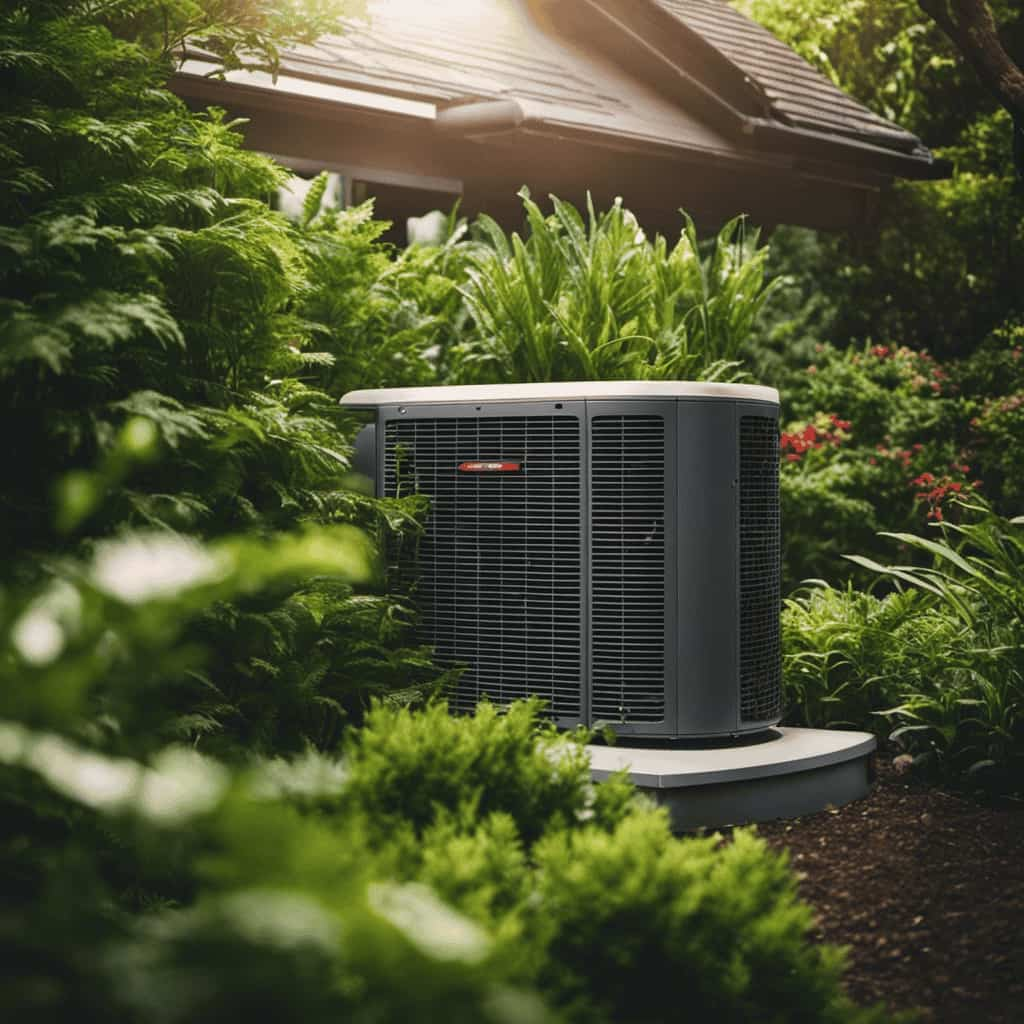
-
Pressure testing: This method involves pressurizing the heat pump with nitrogen gas and monitoring for any pressure drops. A drop in pressure indicates a refrigerant leak.
Detecting refrigerant leaks is crucial because the consequences of these leaks can be significant. Refrigerant leaks not only reduce the cooling or heating capacity of the heat pump, but they can also lead to higher energy consumption, increased repair costs, and potential damage to the compressor.
Therefore, it’s vital to detect and fix these leaks as soon as possible to ensure the efficient operation of your heat pump.
Repairing Refrigerant Leakages
Let’s address the process of repairing refrigerant leakages in heat pumps, which involves locating the source of the leak and sealing it to restore proper functioning.
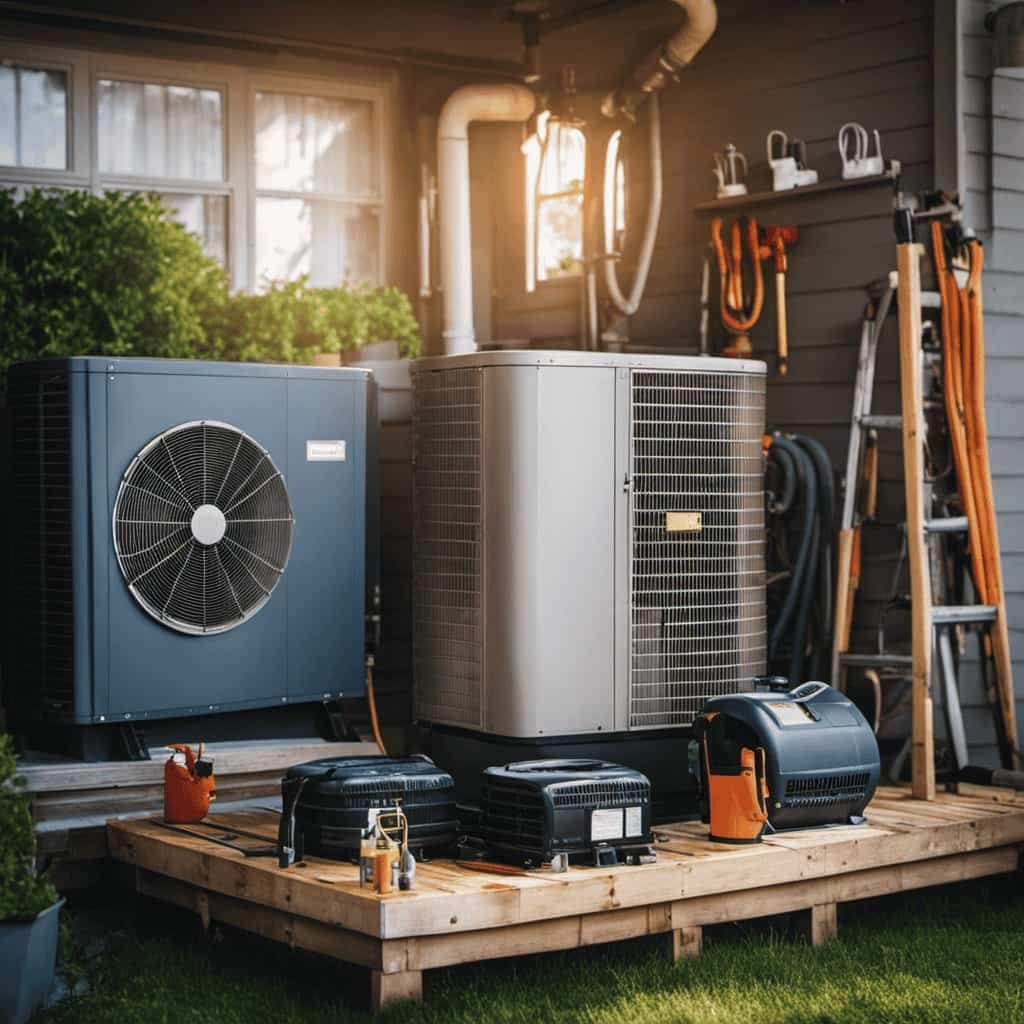
Repairing refrigerant leakages is essential to ensure that the heat pump operates efficiently and maintains optimal cooling or heating performance.
Troubleshooting refrigerant leaks typically begins with a thorough inspection of the system to identify any signs of leakage, such as oil stains or refrigerant residue.
Once the source of the leak is located, it’s important to repair it promptly to prevent further refrigerant loss. This can involve replacing damaged components, such as valves, fittings, or coils, and using appropriate sealing techniques to prevent future leaks.
Additionally, it’s crucial to recharge the system with the correct amount of refrigerant to restore its cooling or heating capacity.

How to Fix Heat Pump Icing Issues
Let’s now address the common issue of heat pump icing and how to fix it.
To prevent heat pump icing, it’s important to ensure proper airflow by regularly cleaning or replacing air filters and checking for any obstructions around the outdoor unit.
When troubleshooting ice buildup, it’s crucial to inspect the refrigerant levels, as low levels can lead to icing.
Lastly, if ice has already formed, dealing with defrosting is necessary, which can be done by activating the heat pump’s defrost mode or manually melting the ice using warm water or a specialized de-icing solution.
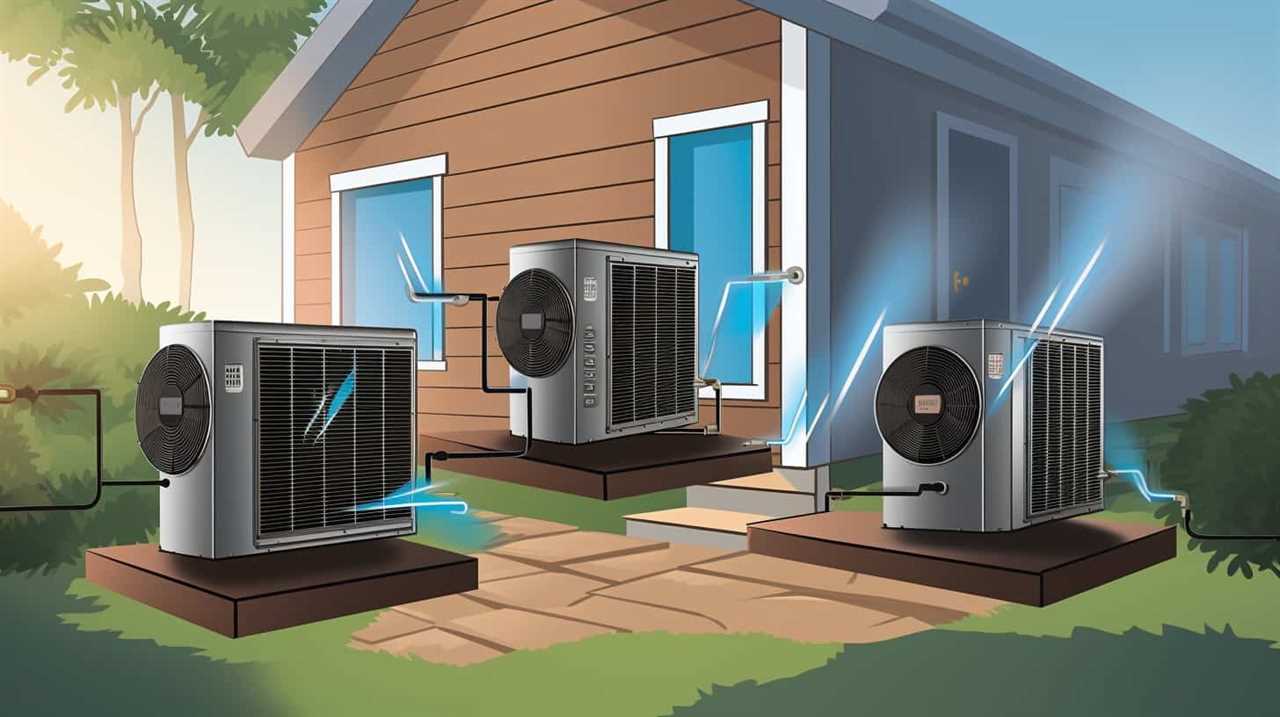
Preventing Heat Pump Icing
To prevent heat pump icing, we should regularly check and clean the outdoor unit, ensure proper airflow, and maintain sufficient refrigerant levels. Here are four important steps to follow in order to prevent frost formation and manage condensation levels:
-
Clean the outdoor unit: Regularly remove any debris, leaves, or dirt that may accumulate on the outdoor unit. This will help maintain optimal airflow and prevent the formation of ice.
-
Inspect and clean the evaporator coils: Over time, the evaporator coils can become dirty and obstructed, leading to reduced airflow and potential icing. Regularly inspect and clean these coils to ensure proper heat exchange.
-
Check and replace air filters: Clogged air filters restrict airflow and can contribute to icing. Check and replace air filters regularly to maintain proper airflow and prevent frost formation.
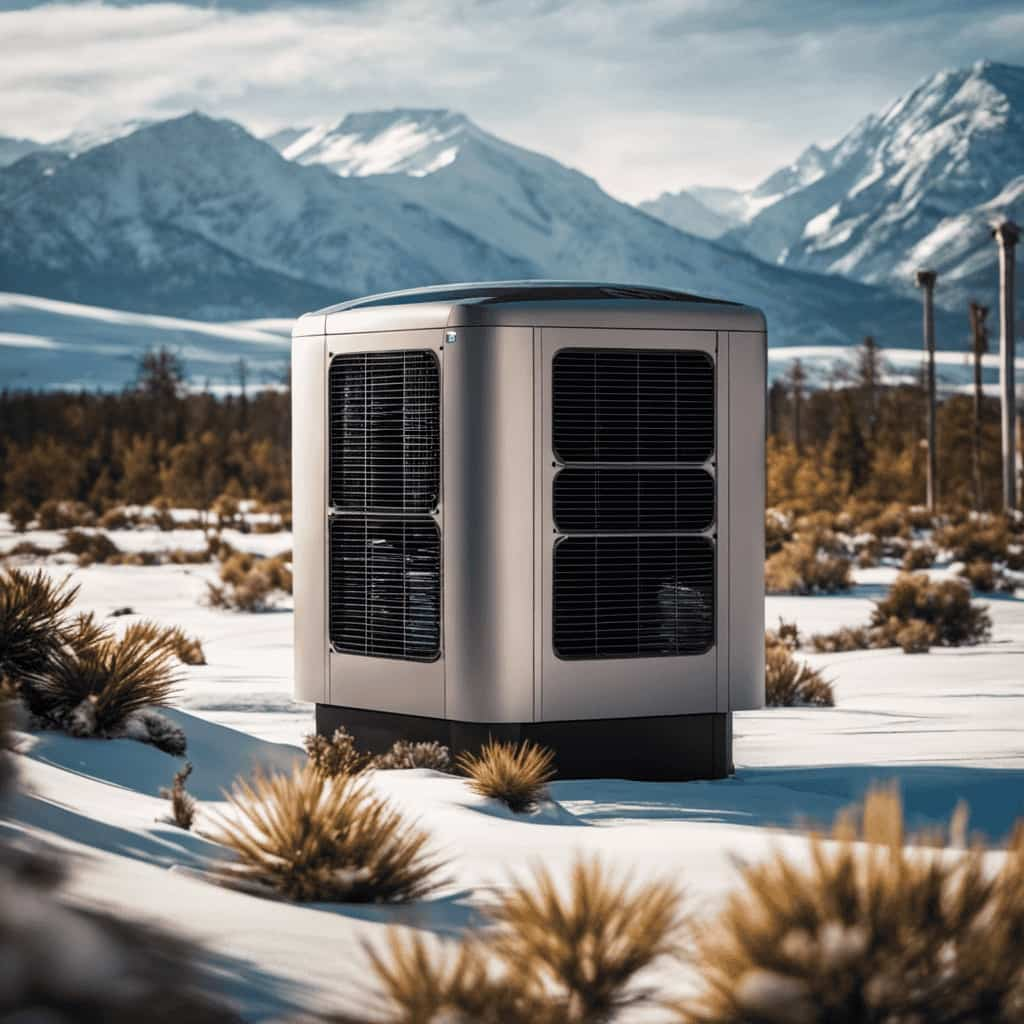
-
Maintain sufficient refrigerant levels: Low refrigerant levels can cause the heat pump to run inefficiently and result in icing. Regularly check and maintain the appropriate refrigerant levels to prevent icing issues.
Troubleshooting Ice Buildup
We can troubleshoot ice buildup on a heat pump by identifying the cause and taking appropriate steps to fix the issue. Preventing ice formation is crucial for the efficient operation of the heat pump.
One common cause of ice buildup is poor airflow, which can be caused by clogged air filters or blocked vents. By regularly cleaning or replacing air filters and ensuring proper airflow, we can prevent ice formation.
Another potential cause is a malfunctioning defrost control board or sensor. Troubleshooting defrosting issues involves checking these components for any faults and replacing them if necessary.

It’s also important to ensure that the heat pump isn’t operating in extremely low temperatures, as this can lead to ice buildup.
By addressing these issues, we can effectively troubleshoot ice buildup and ensure the proper functioning of the heat pump.
Transitioning into the subsequent section about ‘dealing with defrosting’, we’ll now explore the steps to take when faced with a defrosting issue.
Dealing With Defrosting
When faced with heat pump icing issues, it’s important to address the problem promptly in order to prevent further damage and ensure optimal performance. Here are some steps to help you troubleshoot and fix defrosting problems:
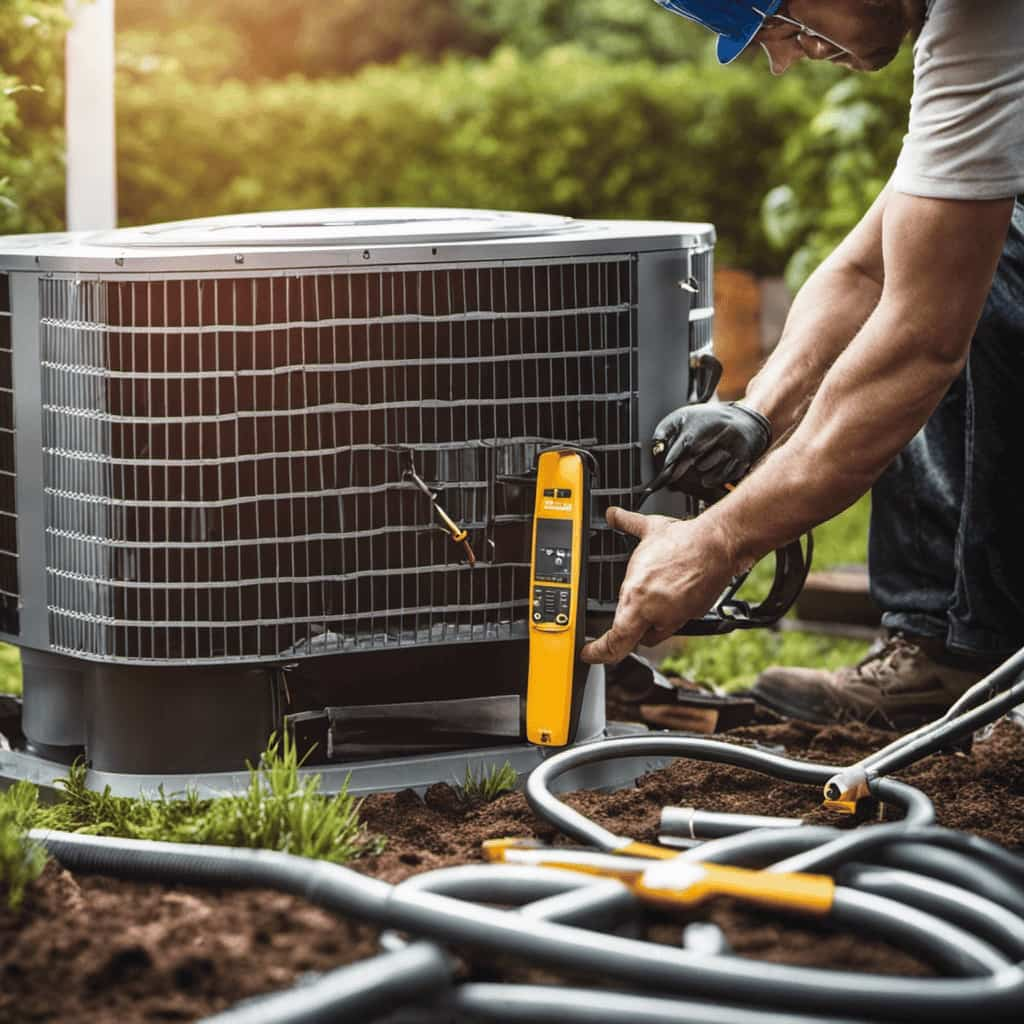
-
Check the outdoor temperature: If the temperature is below 40 degrees Fahrenheit, it’s normal for the heat pump to ice up. However, if the temperature is above 40 degrees and you see ice buildup, there might be an issue.
-
Inspect the defrost control board: This component controls the defrost cycle and should be in good working condition. If it’s faulty, it may prevent the heat pump from defrosting properly.
-
Clean the outdoor unit: Debris, such as leaves or dirt, can obstruct airflow and contribute to icing. Regularly clean the outdoor unit to prevent defrosting issues.
-
Check the refrigerant levels: Low refrigerant levels can lead to improper heat transfer and cause the heat pump to freeze up. Consult a professional to check and recharge the refrigerant if needed.
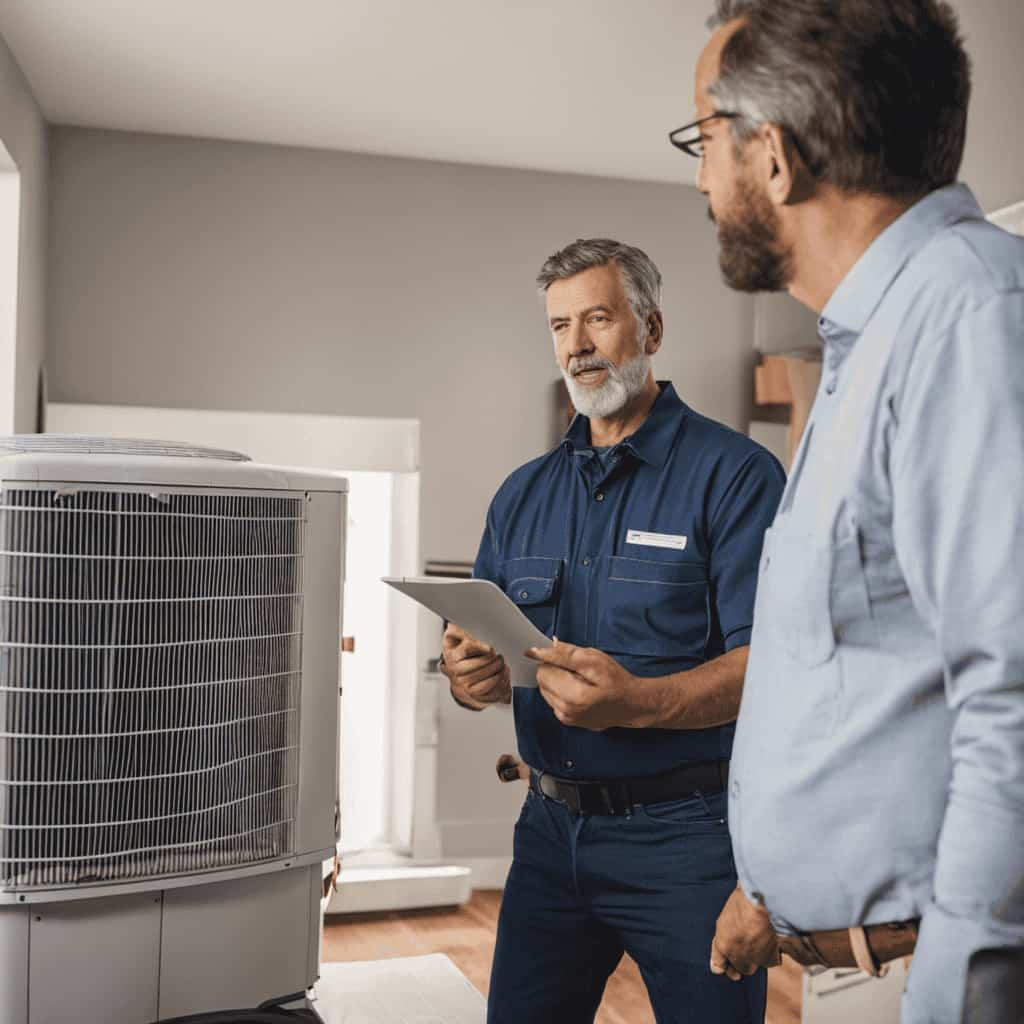
Resolving Noisy Heat Pump Operation
During our troubleshooting process, we discovered effective methods for resolving noisy heat pump operation. Heat pump noise reduction is a common concern for homeowners, as it can be bothersome and disruptive. By identifying the source of the noise and implementing the appropriate solutions, we can help restore peace and quiet to your home. The table below outlines some common sources of heat pump noise and the corresponding troubleshooting steps to resolve them:
| Source of Noise | Troubleshooting Steps |
|---|---|
| Loose components | Tighten or replace loose screws, bolts, or fasteners |
| Fan motor issues | Lubricate the motor or replace worn-out bearings |
| Refrigerant leaks | Repair or replace damaged refrigerant lines |
| Compressor problems | Clean or replace the compressor |
Addressing Heat Pump Cycling Problems
To mitigate heat pump cycling problems, we recommend regularly maintaining and cleaning the outdoor unit. This is crucial as a dirty outdoor unit can cause the heat pump to cycle more frequently, leading to inefficient operation and higher energy consumption. Here are four important steps to ensure optimal heat pump performance and temperature control:
-
Clean the outdoor coils: Accumulated dirt and debris on the coils can restrict airflow, reducing heat transfer efficiency. Regularly cleaning the coils with a soft brush or vacuum will improve airflow and reduce cycling issues.
-
Check the refrigerant levels: Low refrigerant levels can cause the heat pump to cycle more frequently as it struggles to maintain the desired temperature. A professional technician should inspect and recharge the refrigerant if necessary.
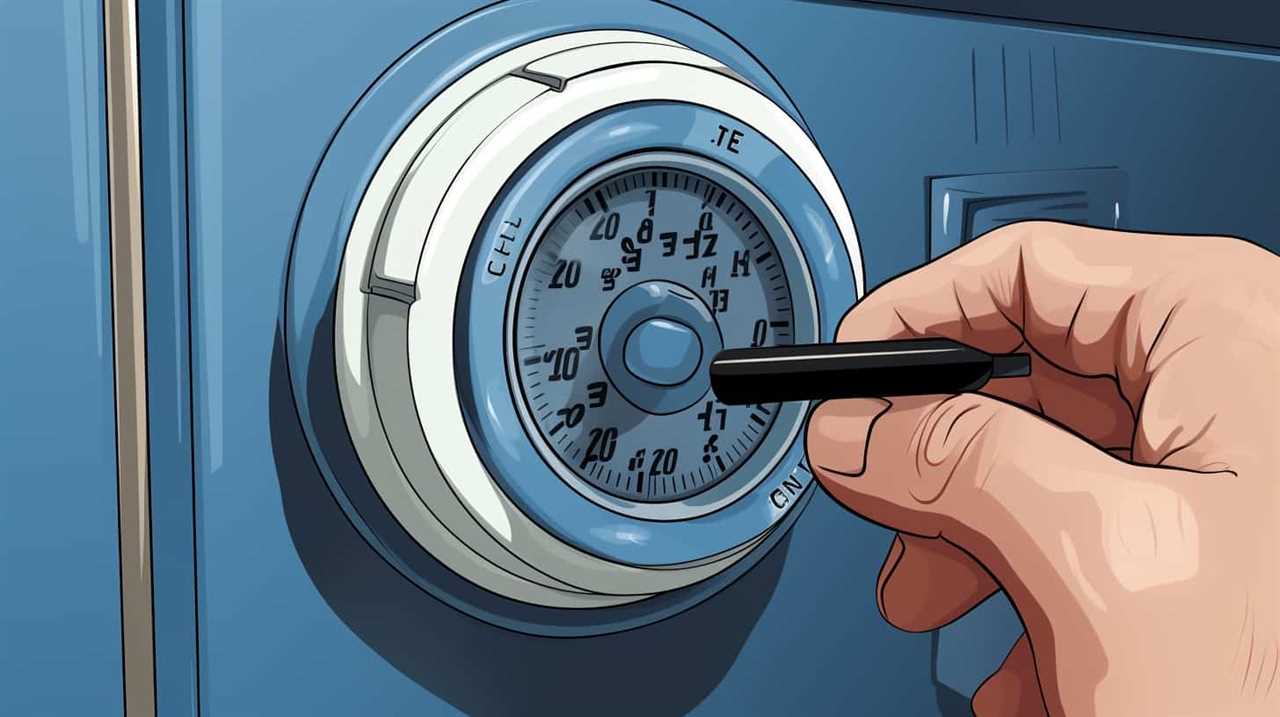
-
Inspect the air filters: Clogged or dirty filters can impede airflow, forcing the heat pump to work harder and cycle more frequently. Clean or replace the filters regularly to ensure optimal performance.
-
Schedule regular maintenance: Professional heat pump maintenance should be performed annually to identify and address any underlying issues that may be causing excessive cycling. This will help prolong the lifespan of the heat pump and improve its overall efficiency.
Frequently Asked Questions
How Can I Improve the Overall Efficiency of My Heat Pump?
To improve the overall efficiency of our heat pump, we can start by improving insulation in our home. Additionally, optimizing the thermostat settings can help regulate temperature and reduce energy consumption, ultimately increasing efficiency.
Is It Normal for My Heat Pump to Make a Humming Noise?
Yes, it is normal for heat pumps to make a humming noise. However, if the noise is excessive or disruptive, it may indicate a problem. Troubleshooting the issue and improving noise levels can help resolve this.
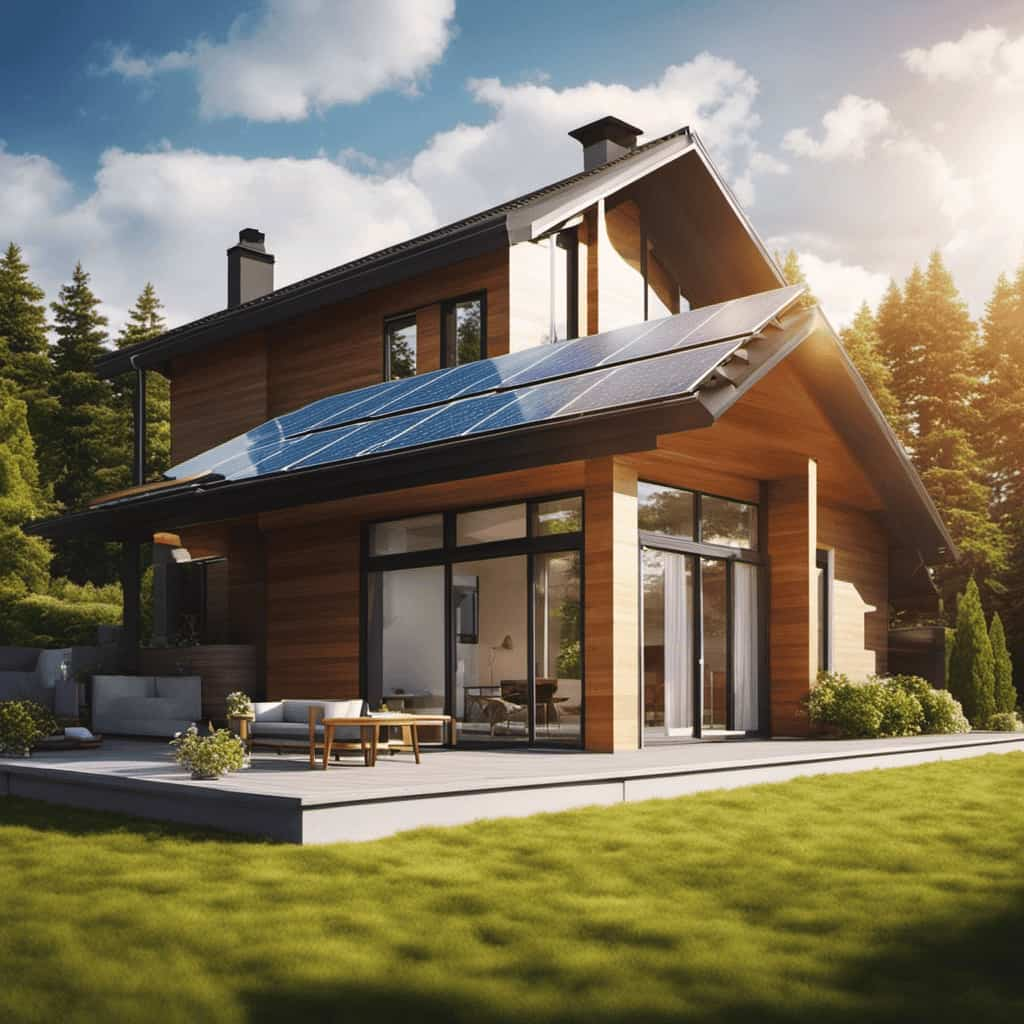
Can I Use My Heat Pump During Extremely Cold Weather?
Yes, you can use your heat pump during extremely cold weather. However, it’s important to perform regular heat pump maintenance to ensure optimal performance. Using a heat pump in cold weather offers benefits like energy efficiency and cost savings.
What Should I Do if My Heat Pump Is Blowing Warm Air Instead of Cold Air?
If your heat pump is blowing warm air instead of cold air, there are several troubleshooting steps you can take. Common causes include thermostat issues, refrigerant leaks, and dirty coils. Let’s dive into the details.
How Often Should I Have My Heat Pump Serviced?
Regular heat pump maintenance is crucial for optimal performance and longevity. We recommend scheduling a professional service at least once a year. Regular servicing ensures peak efficiency, reduces the risk of breakdowns, and improves indoor air quality.
Conclusion
In conclusion, maintaining the proper functioning of your heat pump is crucial for optimal cooling efficiency.
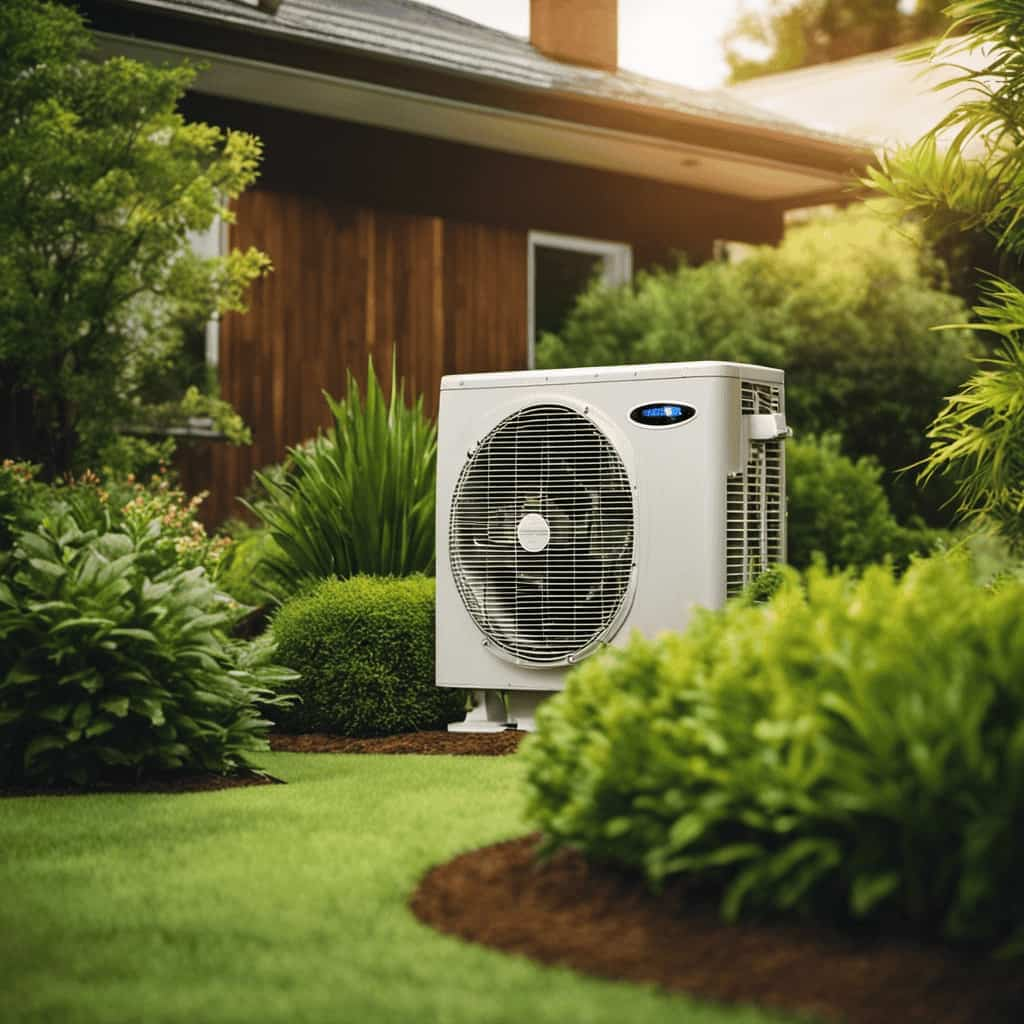
By addressing common issues such as refrigerant leaks, icing, and noisy operation, you can ensure the longevity and effectiveness of your heat pump system.
Just like a well-tuned instrument producing harmonious melodies, a well-maintained heat pump will create a comfortable and soothing environment in your home.
So, take the necessary steps to troubleshoot and resolve any problems, and enjoy the cool comfort your heat pump provides.
Air Conditioning
Renewable Energy: Revolutionizing Heat Pump Performance

We have seen an incredible change in heat pump performance worldwide. The incorporation of renewable energy sources has transformed the efficiency and effectiveness of these systems.
In fact, studies have shown that by incorporating renewable energy, heat pump performance can be enhanced by up to 40%. This statistic alone highlights the immense potential and impact of renewable energy in the realm of heat pumps.
In this article, we will explore the advantages, technologies, and successful applications of this groundbreaking innovation. Get ready to master the future of renewable energy and heat pump performance.
Key Takeaways
- Incorporating renewable energy can enhance heat pump performance by up to 40%.
- Tapping into geothermal energy allows heat pumps to achieve higher efficiencies and reduce reliance on traditional energy sources.
- Integrating renewable energy reduces reliance on fossil fuels and decreases greenhouse gas emissions.
- Variable speed compressors and thermal storage systems are key technologies for enhancing heat pump efficiency with renewable energy.
The Role of Renewable Energy in Heat Pump Performance
In our article, we’ll explore the role of renewable energy in revolutionizing heat pump performance.
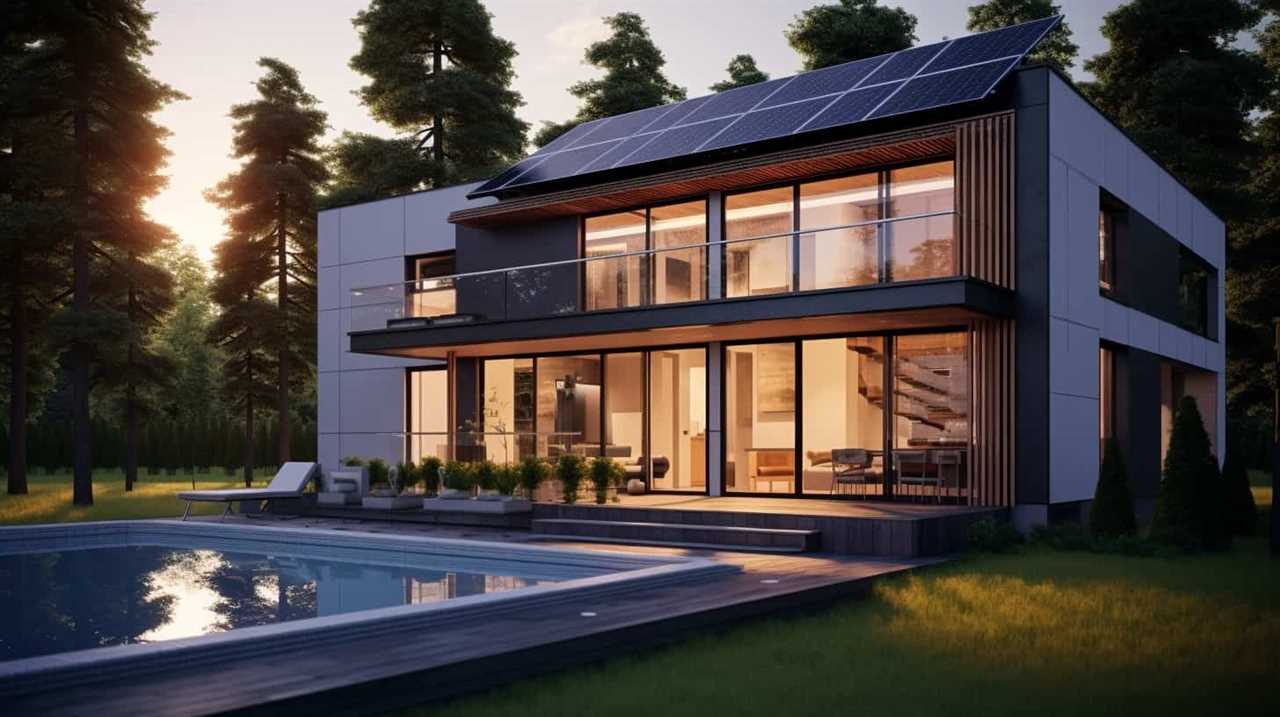
One key aspect is the utilization of geothermal energy, which plays a crucial role in enhancing heat pump performance. Geothermal energy harnesses the heat stored within the Earth, providing a consistent and renewable source of power for heat pumps. By tapping into this energy, heat pumps can achieve higher efficiencies and reduce their reliance on traditional energy sources.
Another significant factor is the impact of solar energy on heat pump efficiency. Solar energy, through the use of photovoltaic panels, can power heat pumps directly, enabling them to operate without drawing electricity from the grid. This integration of solar energy further enhances the overall performance and sustainability of heat pumps.
As we delve into the advantages of integrating renewable energy with heat pumps, these aspects will become even more apparent.
Advantages of Integrating Renewable Energy With Heat Pumps
How can integrating renewable energy with heat pumps benefit us?

The integration of renewable energy with heat pumps offers several advantages, making it a compelling option for optimizing heat pump performance. By harnessing renewable energy sources such as solar or wind power, we can significantly reduce our reliance on fossil fuels and decrease greenhouse gas emissions. This not only contributes to a more sustainable and environmentally friendly energy system but also helps to combat climate change.
Additionally, integrating renewable energy with heat pumps can lead to cost savings by reducing energy consumption and lowering utility bills. Moreover, renewable energy integration allows for better control and flexibility in managing energy supply and demand, leading to improved overall system efficiency.
These benefits highlight the potential of combining renewable energy and heat pumps to create a more efficient and sustainable heating and cooling solution.
In the next section, we’ll explore key technologies for enhancing heat pump efficiency with renewable energy.

Key Technologies for Enhancing Heat Pump Efficiency With Renewable Energy
By utilizing advanced technologies and incorporating renewable energy sources, we can significantly enhance the efficiency of heat pumps. In renewable energy applications, heat pump optimization plays a crucial role in achieving higher performance levels.
One key technology for enhancing heat pump efficiency is the use of variable speed compressors. These compressors allow for precise control of the heat pump’s operation, adjusting the speed and capacity according to the heating or cooling demand. By matching the output to the required load, energy wastage is minimized, resulting in improved efficiency.
Another technology is the integration of thermal storage systems. These systems store excess thermal energy generated by the heat pump during periods of low demand and release it during peak demand, reducing the need for the heat pump to operate at full capacity.
Furthermore, advanced control algorithms and sensors can optimize the heat pump’s operation by continuously monitoring and adjusting parameters such as temperature, pressure, and airflow.

These technologies, when combined with renewable energy sources, can revolutionize heat pump performance, making them a key component in achieving sustainable and efficient heating and cooling systems.
Case Studies: Successful Applications of Renewable Energy in Heat Pump Systems
We frequently encounter successful applications of renewable energy in heat pump systems, showcasing their effectiveness and potential for widespread adoption. These case studies provide real-world examples of how renewable energy can be integrated into heat pump systems to achieve significant energy savings and reduce carbon emissions.
| Case Study | Description |
|---|---|
| Residential Building | A residential building in a cold climate utilized a ground source heat pump system with geothermal energy. This system was able to provide heating and cooling for the entire building while reducing energy consumption by 50%. |
| Industrial Facility | An industrial facility implemented an air-to-water heat pump system with solar thermal panels. This system was able to meet the facility’s heating and hot water demands while reducing energy costs by 40%. |
| Commercial Complex | A commercial complex installed an air-source heat pump system with rooftop solar panels. This system provided heating and cooling for the complex, resulting in a 30% reduction in energy consumption and significant cost savings. |
These successful case studies demonstrate the feasibility and benefits of incorporating renewable energy into heat pump systems, making them a viable solution for achieving sustainable and efficient heating and cooling in various applications.
Future Prospects: Innovations and Trends in Renewable Energy for Heat Pumps
As we look ahead, the future prospects for renewable energy in heat pumps show promising innovations and emerging trends. The advancements in renewable energy for heat pumps are driving the industry towards a more sustainable and efficient future.

Here are four key areas where we see significant developments:
-
Integration of Energy Storage:
With the increasing availability and declining costs of batteries, integrating energy storage systems with heat pumps is becoming more feasible. This allows for better utilization of renewable energy sources and increased flexibility in managing energy demand. -
Smart Grid Integration:
The integration of heat pumps with smart grid technologies enables demand response and grid optimization. By leveraging real-time data and advanced control algorithms, heat pumps can be operated more efficiently and contribute to a more resilient and reliable grid. -
Hybrid Systems:
Combining heat pumps with other renewable energy technologies, such as solar thermal or geothermal, can enhance their performance and overall energy efficiency. These hybrid systems offer the potential for higher energy savings and reduced carbon emissions.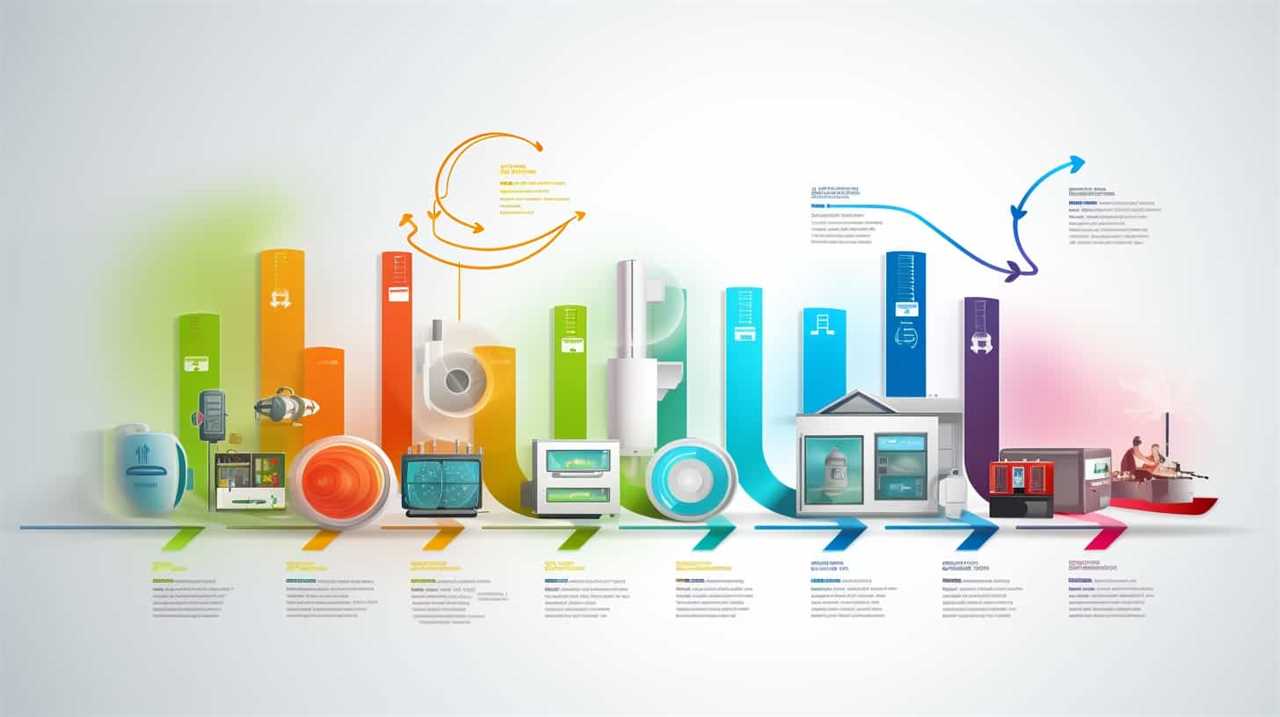
-
Heat Pump Electrification:
As the electricity sector transitions to renewable sources, electrifying heat pumps becomes an attractive option. This trend opens up new market opportunities for renewable energy in the heat pump industry, with the potential to significantly reduce greenhouse gas emissions.
These emerging technologies and market opportunities are paving the way for a greener and more sustainable future for heat pumps. By embracing these innovations and trends, we can revolutionize the performance and impact of renewable energy in the heat pump sector.
Frequently Asked Questions
How Do Heat Pumps Work and What Is Their Role in Renewable Energy Systems?
Heat pump technology utilizes the transfer of heat from one place to another, providing efficient heating and cooling. Its role in renewable energy systems lies in its ability to extract heat from renewable sources, reducing reliance on fossil fuels and lowering carbon emissions.
What Are the Main Advantages of Integrating Renewable Energy Sources With Heat Pumps?
What are the main advantages of integrating renewable energy sources with heat pumps? By combining renewable energy with heat pumps, we maximize energy efficiency, reduce carbon emissions, and contribute to a sustainable future.

What Are Some Key Technologies That Can Enhance the Efficiency of Heat Pumps When Combined With Renewable Energy?
Energy efficient technologies, such as advanced compressors and smart controls, can significantly enhance the efficiency of heat pumps when combined with renewable energy sources. These innovations optimize performance and maximize the utilization of clean, sustainable energy.
Can You Provide Any Real-Life Examples of Successful Applications of Renewable Energy in Heat Pump Systems?
Real-life case studies showcase the benefits and challenges of incorporating renewable energy into heat pump systems. One example is the successful application of geothermal heat pumps in residential buildings, reducing energy consumption and carbon emissions.
What Are the Current and Future Innovations and Trends in Renewable Energy for Heat Pumps?
Innovations in heat pump technology and future trends in renewable energy for heat pumps are shaping the way we maximize efficiency and reduce emissions. We explore the latest advancements and upcoming developments in this field.
Conclusion
In conclusion, the integration of renewable energy with heat pump systems has revolutionized their performance, offering numerous advantages and enhancing efficiency. This combination of technologies has proven successful in various case studies, showcasing its potential for widespread implementation.
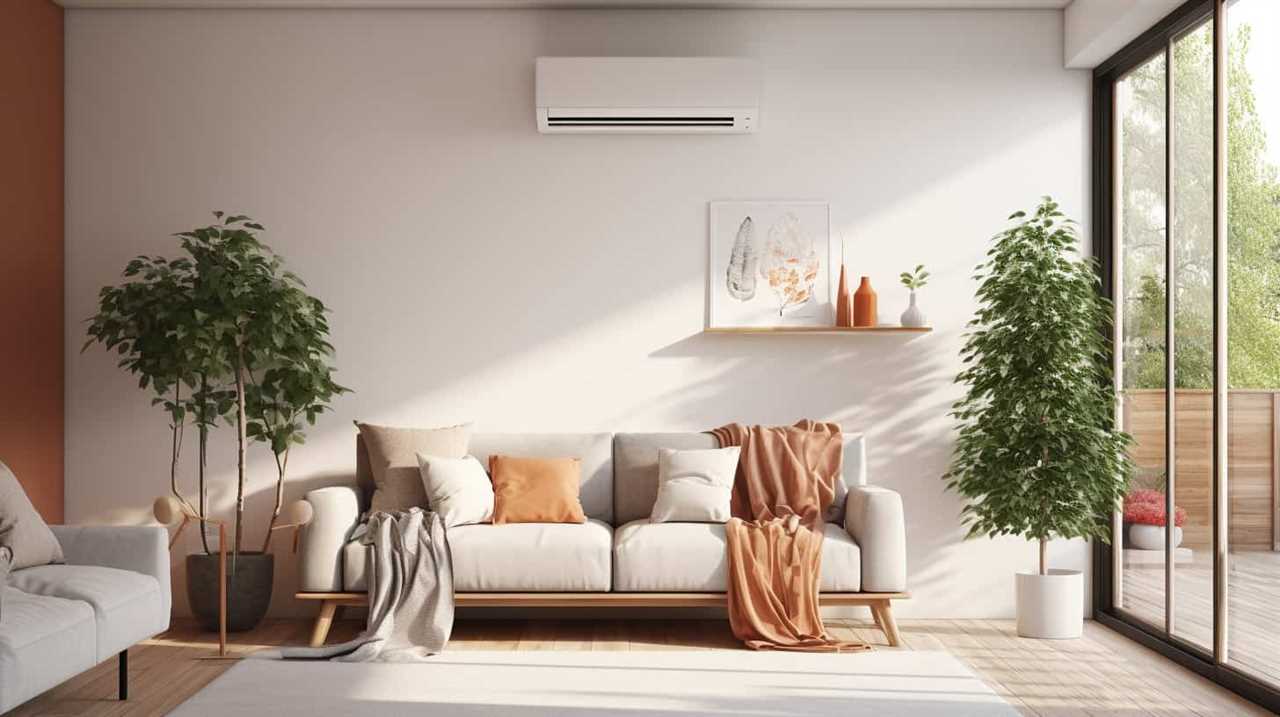
As innovations continue to emerge, the future prospects for renewable energy in heat pumps are promising. By harnessing the power of renewable sources, we can achieve sustainable and cost-effective heating solutions, paving the way for a greener and more efficient future.
Remember, ‘Innovation is the key to unlocking a sustainable future.’
Air Conditioning
Understanding Energy-Efficient Heat Pumps for Green Homes

We have all the information on energy-efficient heat pumps for environmentally friendly homes. These sustainable systems are top-notch when it comes to heating and cooling while also benefiting the planet.
In this article, we’ll break down how these pumps work, what to consider when choosing one, and the different types available. Plus, we’ll share tips on maximizing energy savings through proper maintenance.
Get ready to dive into the world of eco-friendly heating and cooling!
Key Takeaways
- Energy-efficient insulation materials and renewable energy sources are important for creating eco-friendly and cost-effective green homes.
- Heat pumps utilize heat transfer to provide sustainable heating and cooling while minimizing environmental impact.
- When choosing an energy-efficient heat pump, consider factors such as SEER and HSPF ratings, variable speed compressors, dual fuel capability, and environmentally friendly refrigerants.
- Different types of heat pumps, such as air source, ground source, and water source, have different applications based on climate, available space, and budget.
The Importance of Energy Efficiency in Green Homes
We believe that maximizing energy efficiency should be a top priority in our green homes. One way to achieve this is through energy-efficient insulation. By using insulation materials that have a high R-value, such as cellulose or spray foam, we can reduce heat loss and minimize the need for heating or cooling. This not only helps to lower energy consumption but also creates a comfortable living environment.

Additionally, incorporating renewable energy sources in energy-efficient homes can further enhance their sustainability. Solar panels, for example, can harness the power of the sun to generate electricity, reducing our reliance on fossil fuels. By prioritizing energy efficiency and utilizing renewable energy sources, we can create homes that are both eco-friendly and cost-effective.
Transitioning to the next section, let’s now explore how heat pumps work for sustainable heating and cooling.
How Heat Pumps Work for Sustainable Heating and Cooling
To understand how heat pumps work for sustainable heating and cooling, it’s important to grasp the process of heat transfer and the role of refrigerant in this system.
Heat pump technology utilizes the principle of heat transfer to extract heat from the environment and transfer it into a building for heating or remove heat from the building for cooling. This process is achieved by circulating a refrigerant, which absorbs heat when it evaporates and releases heat when it condenses. The refrigerant acts as the medium that facilitates the transfer of heat.

By utilizing this process, heat pumps can provide efficient heating and cooling while minimizing their environmental impact.
Now that we understand the basics of how heat pumps work, let’s explore the key factors to consider when choosing an energy-efficient heat pump.
Key Factors to Consider When Choosing an Energy-Efficient Heat Pump
Considering the efficiency, cost, and environmental impact are key factors when choosing an energy-efficient heat pump. To ensure you make the right decision, here are some important criteria and energy-saving features to consider:
-
Seasonal Energy Efficiency Ratio (SEER): Look for a heat pump with a high SEER rating, as it indicates better energy efficiency.

-
Heating Seasonal Performance Factor (HSPF): Higher HSPF ratings translate to more efficient heating performance.
-
Variable Speed Compressor: This feature allows the heat pump to adjust its speed according to the heating or cooling needs, resulting in better energy savings.
-
Dual Fuel Capability: Opt for a heat pump that can switch between electric and gas heating, allowing you to choose the most cost-effective option.
-
Refrigerant Type: Consider heat pumps that use environmentally friendly refrigerants with low global warming potential.
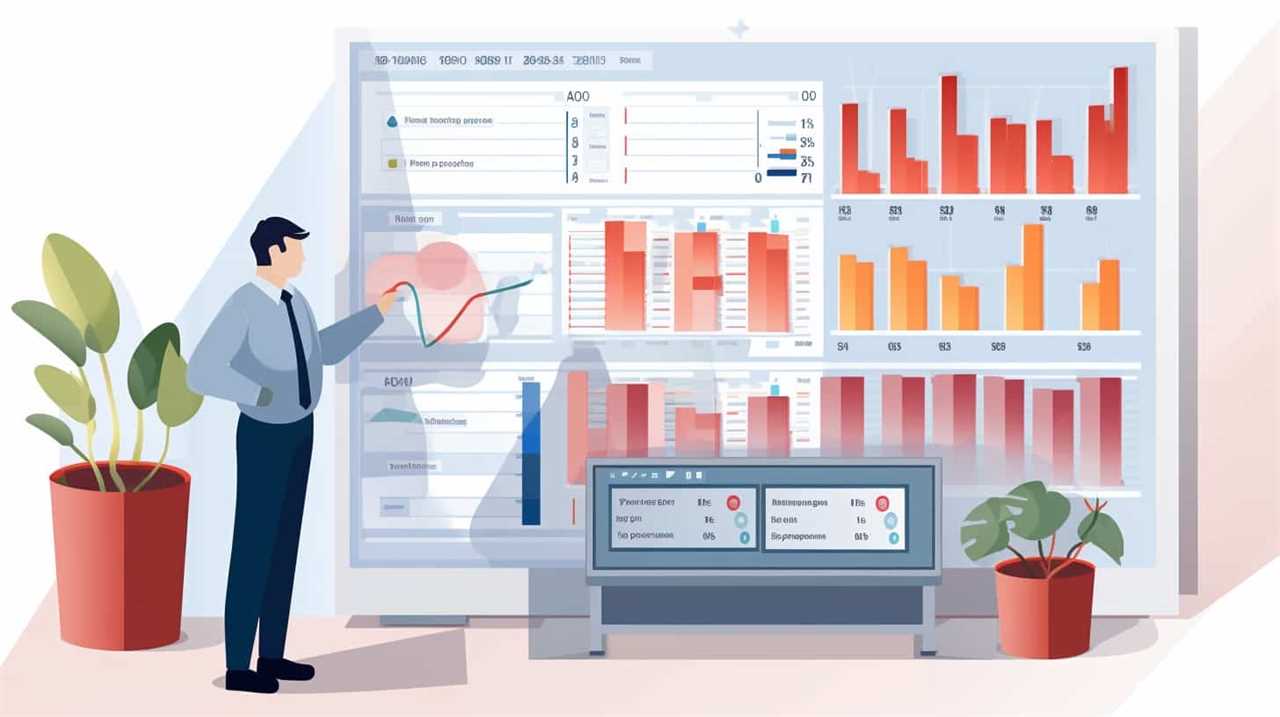
Understanding the Different Types of Heat Pumps for Green Homes
As we delve into the topic of understanding the different types of heat pumps for green homes, it is important to note that there are several options available to homeowners. Heat pumps are a popular choice for heating and cooling homes efficiently while minimizing environmental impact. Let’s take a closer look at the different types of heat pumps commonly used in green homes:
| Type | Description | Benefits |
|---|---|---|
| Air Source | Transfers heat between the indoor air and outdoor air | Cost-effective, easy installation, suitable for moderate climates |
| Ground Source | Utilizes the stable temperature of the ground to heat and cool homes | Highly efficient, long lifespan, consistent performance |
| Water Source | Extracts heat from water bodies, such as lakes or wells | High efficiency, versatile applications, reliable performance |
Choosing the right type of heat pump for your green home depends on factors such as climate, available space, and budget. Additionally, it’s worth exploring heat pump installation rebates and incentives offered by local and federal governments to make your investment more affordable.
Maximizing Energy Savings With Proper Heat Pump Maintenance
By regularly performing proper heat pump maintenance, we can maximize energy savings in our green homes. Maintaining our heat pumps not only ensures their efficiency but also reduces our carbon footprint. Here are some heat pump maintenance tips and energy-saving practices to help us achieve optimal performance and energy efficiency:
- Clean or replace air filters regularly to improve airflow and reduce energy consumption.
- Keep the outdoor unit free from debris, such as leaves and branches, to maintain proper airflow.
- Schedule professional maintenance annually to check for refrigerant leaks, clean coils, and optimize system performance.
- Insulate the air ducts to minimize heat loss during the distribution process.
- Use a programmable thermostat to set temperature schedules and avoid unnecessary energy consumption.
Frequently Asked Questions
Can Heat Pumps Be Used to Heat Water in Addition to Providing Heating and Cooling for the Home?
Yes, heat pumps can be used for heating water as well as providing heating and cooling for the home. Using heat pumps for swimming pools and water heating offers numerous benefits, such as energy efficiency and reduced greenhouse gas emissions.
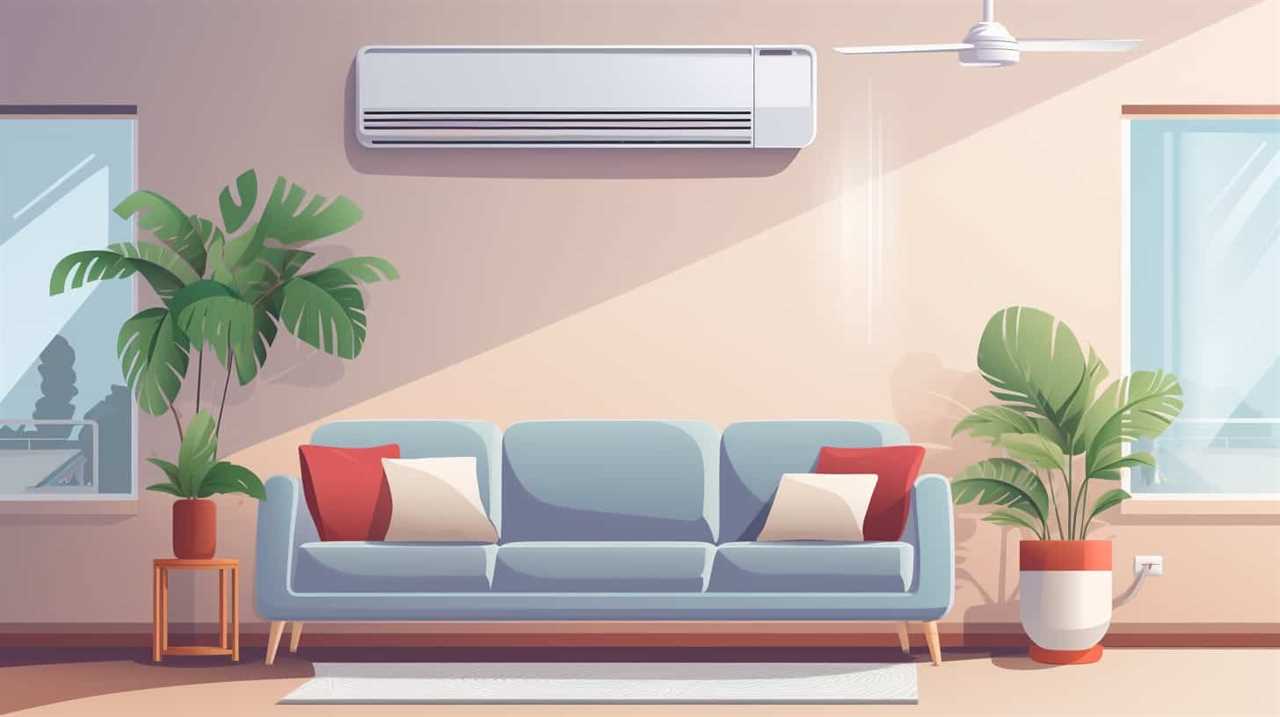
Are There Any Government Incentives or Rebates Available for Installing Energy-Efficient Heat Pumps in Green Homes?
Yes, there are government incentives, rebates, and tax credits available for installing energy-efficient heat pumps in green homes. These financial assistance programs aim to promote the use of energy-efficient technologies and reduce carbon emissions.
What Is the Average Lifespan of an Energy-Efficient Heat Pump?
The average lifespan of an energy-efficient heat pump is typically around 15 to 20 years. Regular maintenance tasks, such as cleaning and replacing filters, can help prolong its lifespan and ensure optimal performance.
Are There Any Specific Maintenance Tasks That Homeowners Can Do Themselves to Ensure the Optimal Performance of Their Heat Pump?
To ensure optimal performance of your heat pump, there are self-maintenance tips and troubleshooting techniques you can follow. Regularly cleaning or replacing air filters, checking refrigerant levels, and inspecting outdoor units are essential tasks.
How Does the Cost of Operating an Energy-Efficient Heat Pump Compare to Traditional Heating and Cooling Systems?
Operating costs comparison between energy-efficient heat pumps and traditional heating and cooling systems reveal significant energy savings. Our research shows that these green alternatives are not only eco-friendly but also cost-effective in the long run.
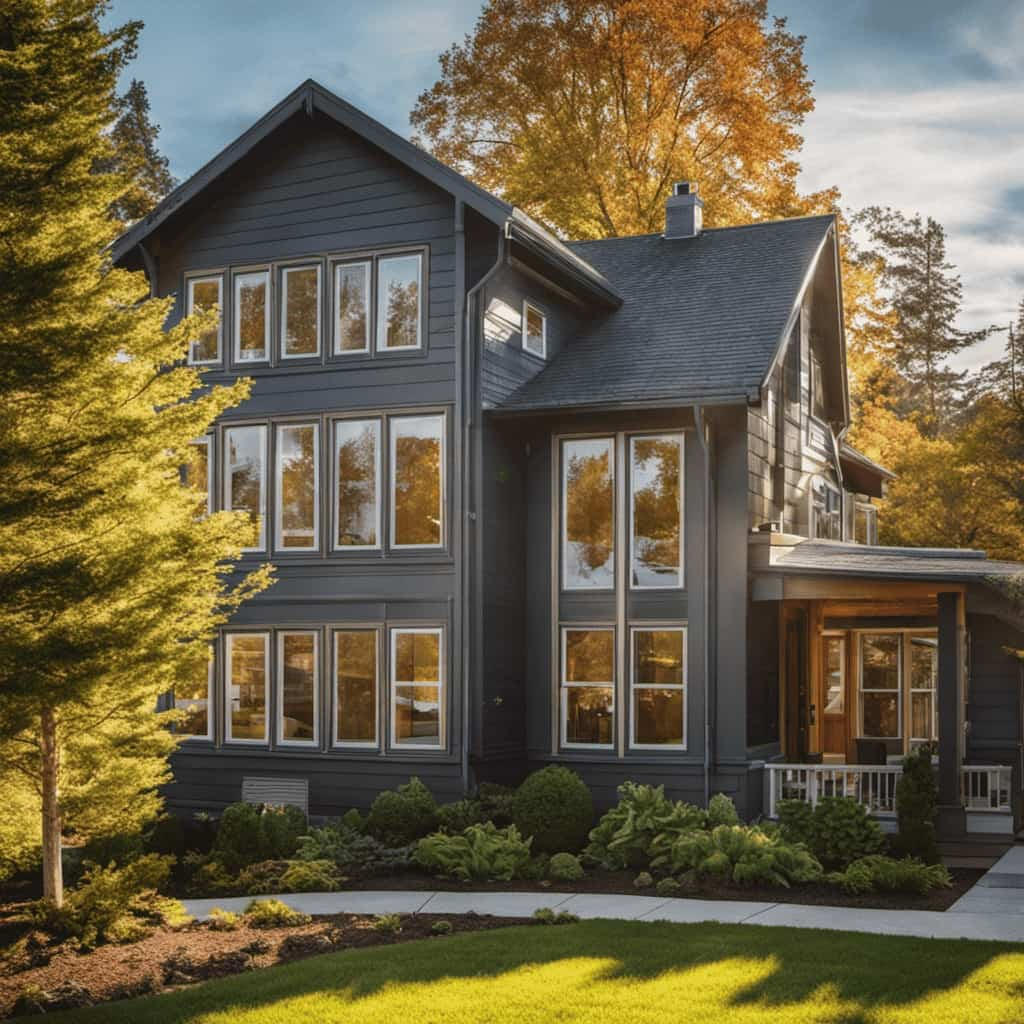
Conclusion
In conclusion, energy-efficient heat pumps are a vital component of green homes, providing sustainable heating and cooling. By understanding how they work and considering key factors when choosing a heat pump, homeowners can maximize energy savings.
Regular maintenance is also essential to ensure optimal performance and longevity. Just imagine a green home with a heat pump silently working, seamlessly providing comfort while minimizing environmental impact.
It’s a vision of a sustainable future that we can all strive for.
Air Conditioning
Heat Pumps Outperform Traditional Heating in Energy Use
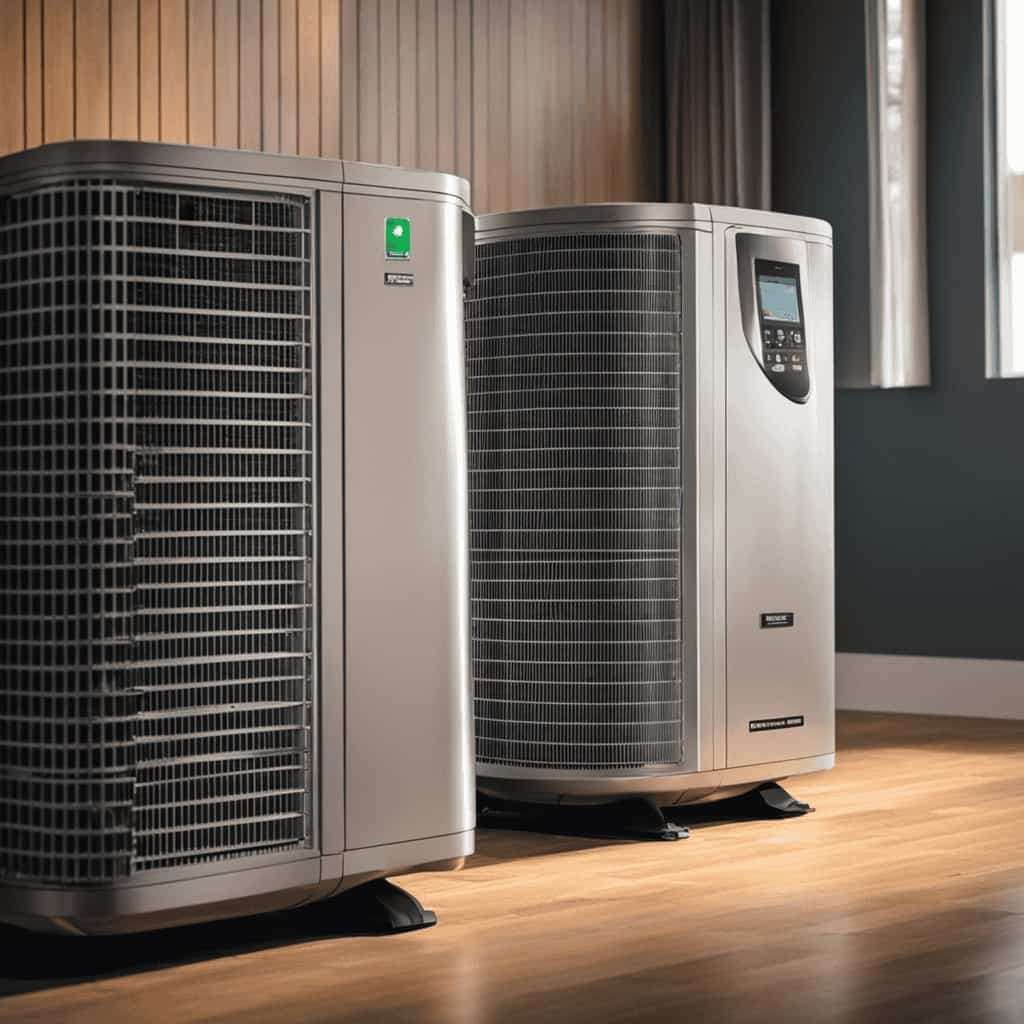
We have some thrilling news for you: heat pumps are surpassing traditional heating systems in terms of energy efficiency! Recent studies have demonstrated that heat pumps can greatly decrease electricity usage in comparison to traditional methods.
Not only that, but they also offer cost savings and have a lower environmental impact. So if you’re looking for long-term benefits and want to save money on your energy bills, heat pumps are the way to go.
Key Takeaways
- Heat pumps are more energy efficient compared to traditional heating systems.
- Heat pumps require less energy to heat a space compared to traditional heating systems, resulting in cost savings for the user.
- Heat pumps have a lower carbon footprint compared to traditional heating systems.
- Government incentives and rebates are available for installing energy-efficient heat pumps, further reducing the overall cost.
Energy Efficiency of Heat Pumps Vs. Traditional Heating Systems
We find that heat pumps are more energy efficient compared to traditional heating systems. Heat pumps use electricity to transfer heat from the outside air or ground into the building, making them highly efficient in terms of energy consumption. This means that they require less energy to heat a space compared to traditional heating systems, resulting in cost savings for the user.
Additionally, heat pumps have a lower carbon footprint compared to traditional heating systems. They don’t burn fossil fuels directly, reducing greenhouse gas emissions and contributing to a cleaner environment. This makes heat pumps a more environmentally friendly option for heating, aligning with the values of individuals seeking freedom to live in a sustainable and eco-conscious manner.

Electricity Consumption Comparison: Heat Pumps Vs. Traditional Heating
The electricity consumption of heat pumps is compared to that of traditional heating systems. To provide a clear analysis of electricity consumption, let’s compare the energy savings of heat pumps and traditional heating systems in a 3×3 table:
| System | Electricity Consumption | Energy Savings |
|---|---|---|
| Heat Pumps | Lower | Significant |
| Traditional Heating | Higher | Less significant |
As shown in the table, heat pumps have lower electricity consumption compared to traditional heating systems. This translates into significant energy savings for users. Heat pumps are designed to efficiently extract heat from the surrounding environment, making them more energy-efficient than traditional heating methods. By utilizing renewable energy sources, such as air, water, or the ground, heat pumps reduce reliance on fossil fuels and contribute to a greener and more sustainable future. With their superior energy efficiency, heat pumps are an excellent choice for those looking to minimize electricity consumption while maximizing energy savings.
Cost Savings With Heat Pumps: a Comparative Analysis
Comparing the cost savings of heat pumps to traditional heating systems provides valuable insights into the potential financial benefits of using heat pumps. When it comes to cost savings, heat pumps have a clear advantage over traditional heating systems. Here are some key points to consider:
-
Energy savings: Heat pumps are highly efficient and can save homeowners a significant amount of money on their energy bills. They can extract heat from the air or ground, making them much more energy-efficient than traditional heating systems.

-
Return on investment: While heat pumps may have a higher upfront cost, their long-term savings can make up for it. The energy savings over time can result in a positive return on investment for homeowners.
-
Lower operating costs: Heat pumps require less energy to operate compared to traditional heating systems, resulting in lower monthly utility bills.
-
Reduced maintenance costs: Heat pumps are generally low-maintenance, which means homeowners can save on costly repairs and maintenance fees.
-
Potential incentives: In many areas, there are government incentives and rebates available for installing energy-efficient heat pumps, further reducing the overall cost.
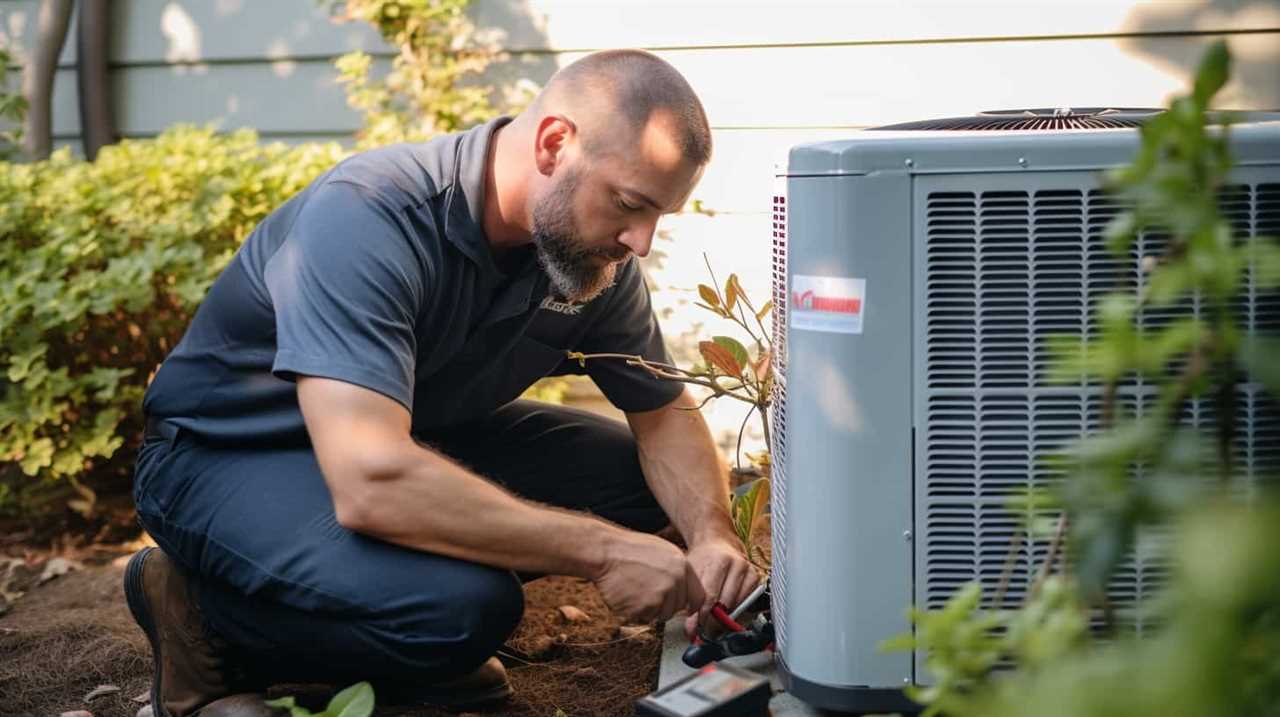
Environmental Impact: Heat Pumps Vs. Traditional Heating Methods
While traditional heating methods contribute to environmental degradation, heat pumps offer a more sustainable alternative. Heat pumps utilize renewable energy sources, such as the air or ground, to provide heating and cooling for homes and buildings. This means they produce fewer carbon emissions compared to traditional heating methods that rely on fossil fuels. By reducing carbon emissions, heat pumps play a crucial role in mitigating climate change and promoting a cleaner environment.
Additionally, heat pumps can be integrated with renewable energy systems, such as solar panels, further reducing reliance on non-renewable energy sources. This integration allows for a more efficient and environmentally-friendly heating solution.
Long-Term Benefits of Heat Pumps in Electricity Usage
As we consider the long-term benefits of heat pumps in electricity usage, it’s important to recognize that they significantly reduce energy consumption compared to traditional heating methods. This not only leads to cost savings in the long run but also contributes to energy conservation efforts.
Here are some key points to highlight:
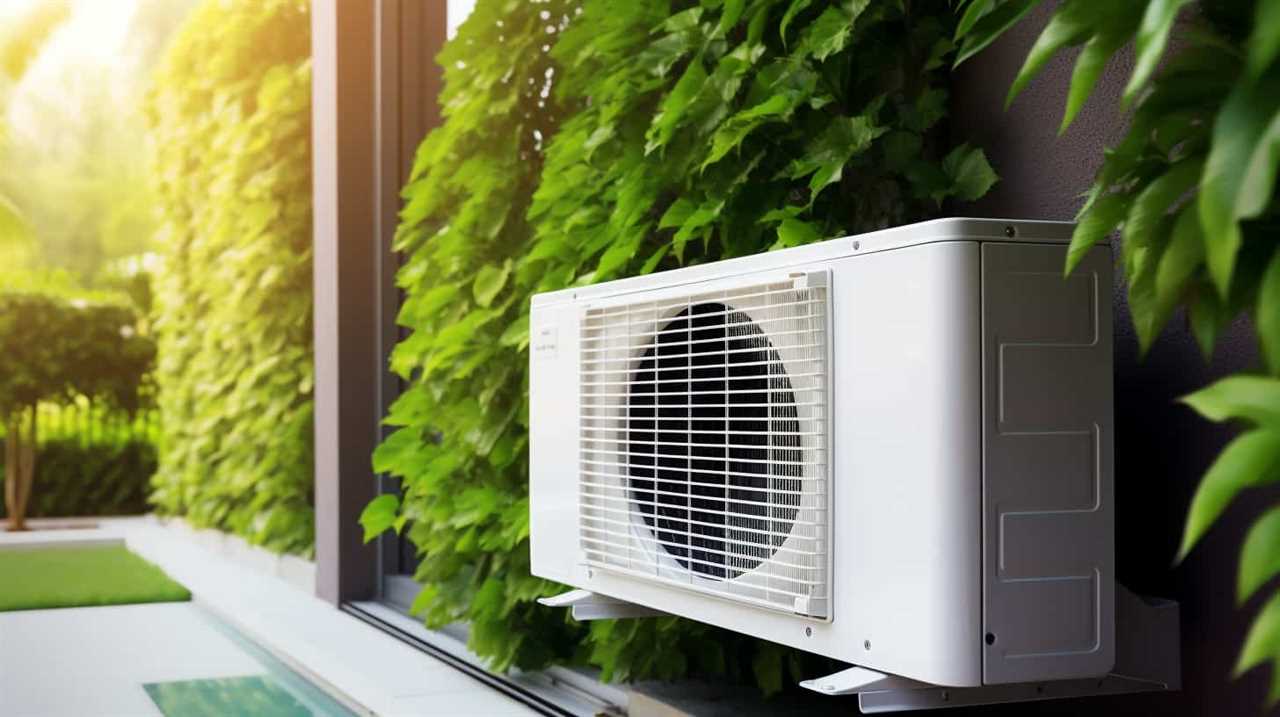
- Heat pumps are highly efficient in converting electricity into heat, resulting in lower energy consumption.
- By reducing energy usage, heat pumps help to lower electricity bills and provide long-term savings.
- Heat pumps have a longer lifespan compared to traditional heating systems, reducing the need for frequent replacements.
- The use of heat pumps can reduce greenhouse gas emissions, contributing to a cleaner environment.
- Heat pumps can be integrated with renewable energy sources, further reducing reliance on fossil fuels.
Frequently Asked Questions
What Are the Different Types of Heat Pumps Available in the Market?
There are several types of heat pumps available in the market. They include air source heat pumps, geothermal heat pumps, and hybrid heat pumps. Each type has its own advantages in terms of heat pump efficiency and benefits of heat pump technology.
How Do Heat Pumps Work in Cold Climates?
In cold climates, heat pumps work efficiently by extracting heat from the outside air or ground and transferring it indoors. This provides an energy-efficient heating solution, making heat pumps advantageous in cold weather.
Are Heat Pumps Suitable for Both Residential and Commercial Buildings?
Heat pumps are a cost-effective solution for both residential and commercial buildings. They not only provide efficient heating and cooling, but also offer environmental benefits by significantly reducing carbon emissions compared to traditional heating methods.
Can Heat Pumps Be Used for Both Heating and Cooling Purposes?
Heat pumps are a versatile solution for both heating and cooling. They offer several advantages for cooling, such as energy efficiency and lower operating costs compared to traditional cooling systems.
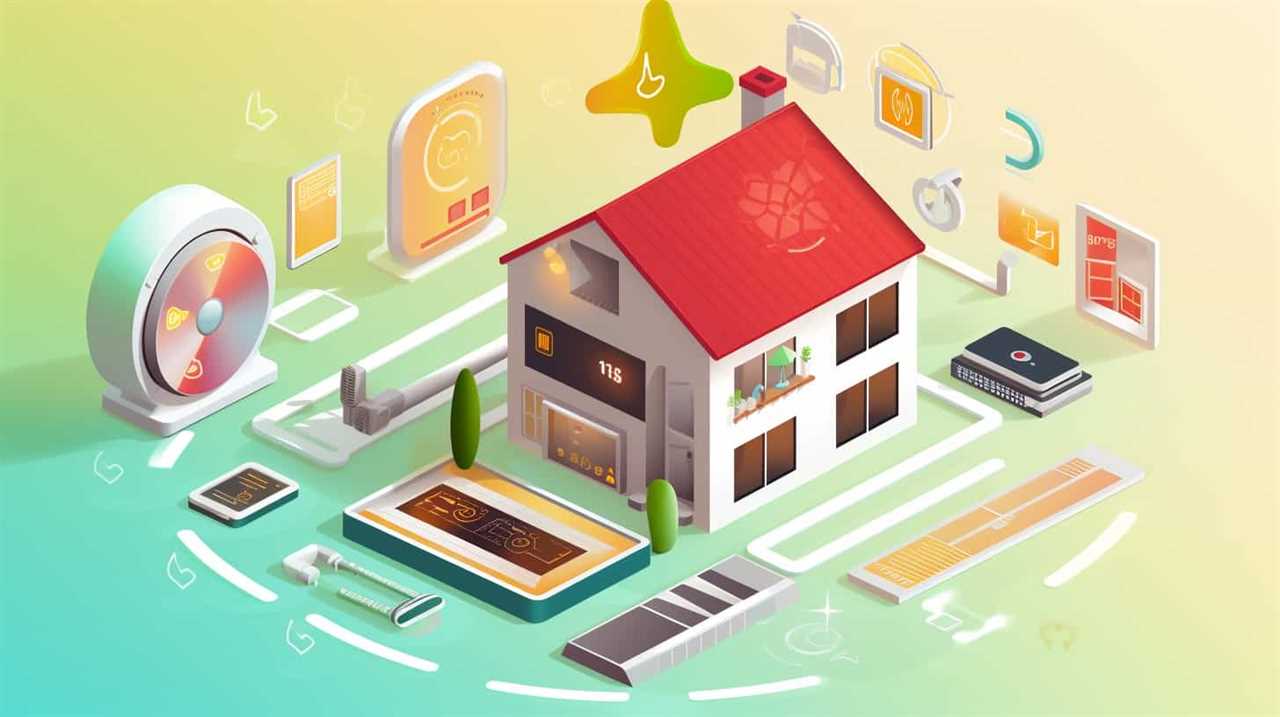
Are There Any Government Incentives or Rebates Available for Installing Heat Pumps?
There are government incentives available for installing heat pumps, which can help offset the cost. Heat pumps are known for their energy efficiency, making them an attractive option for those looking to save on heating and cooling expenses.
Conclusion
In conclusion, heat pumps have proven to be a superior option in terms of energy efficiency, electricity consumption, cost savings, and environmental impact when compared to traditional heating methods.
Their long-term benefits in electricity usage make them a smart choice for homeowners looking to reduce their energy consumption and carbon footprint.
Switching to heat pumps coincides with a greener future and a more sustainable way of heating our homes.
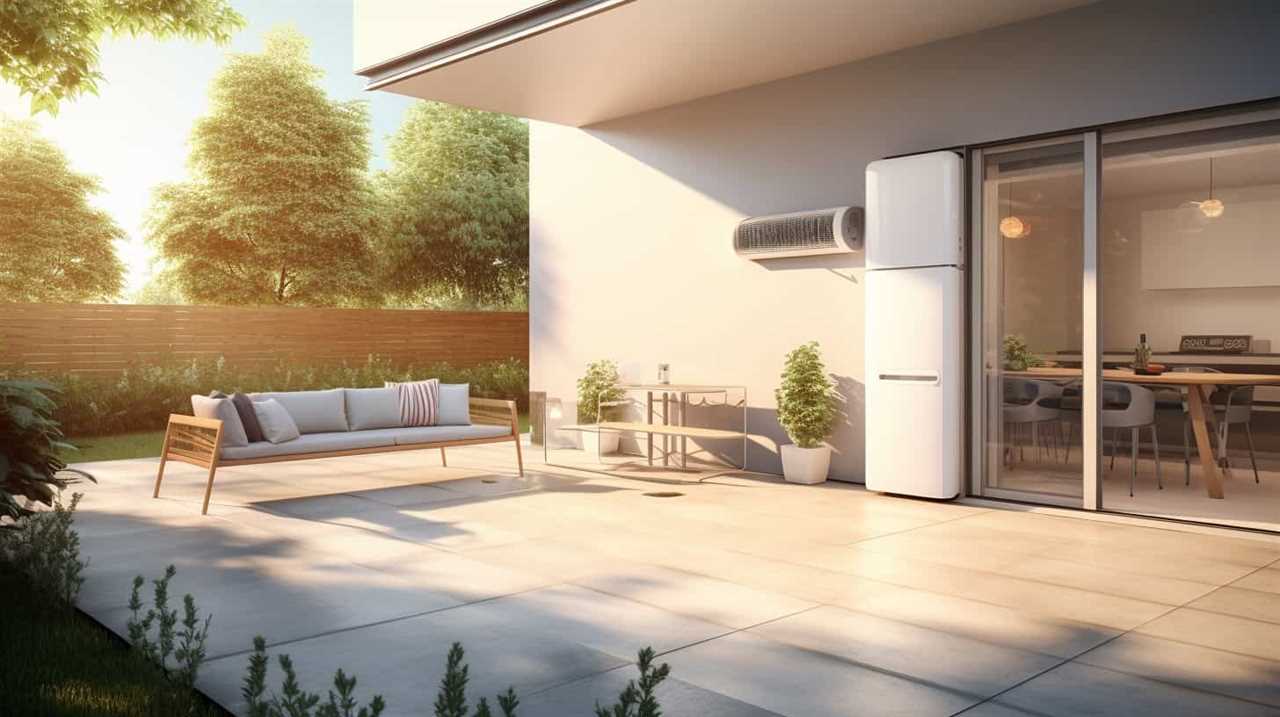
-

 Residential and Commercial Applications2 weeks ago
Residential and Commercial Applications2 weeks agoBest Amana Heat Pump Reviews
-

 Thermal Energy Transfer2 weeks ago
Thermal Energy Transfer2 weeks agoBreakthroughs in Modern Heat Pump Systems: Thermal Energy Edition
-

 Residential and Commercial Applications2 weeks ago
Residential and Commercial Applications2 weeks agoBest Heat Pump
-

 Geothermal Heat Pumps3 months ago
Geothermal Heat Pumps3 months agoUpgrade Your Comfort with Our Efficient HVAC Systems
-

 Air Conditioning3 months ago
Air Conditioning3 months agoExploring Energy-Efficient Air Conditioning Heat Pumps
-

 Geothermal Heat Pumps3 months ago
Geothermal Heat Pumps3 months agoInnovative Geothermal Heat Pump Manufacturers Revolutionize Energy Efficiency
-

 Thermal Energy Transfer1 month ago
Thermal Energy Transfer1 month agoBoost Your Heat Pump Efficiency: Interactive Guide
-

 Residential and Commercial Applications2 weeks ago
Residential and Commercial Applications2 weeks agoBest Portable Heat Pump Heat & AC










